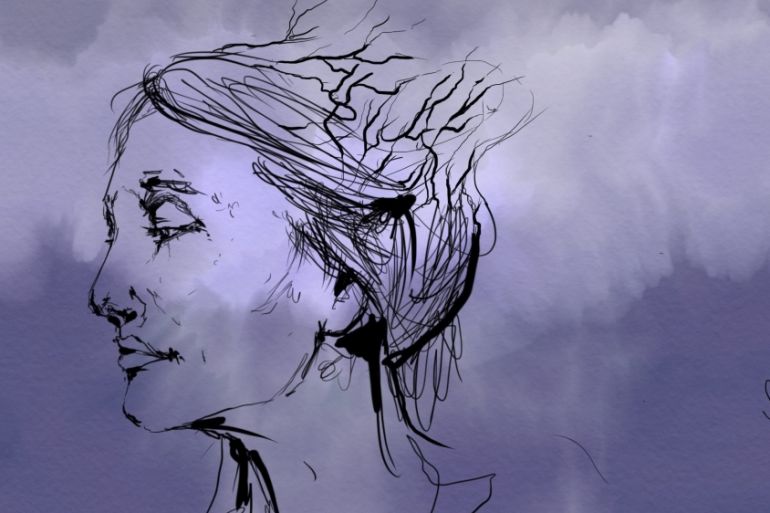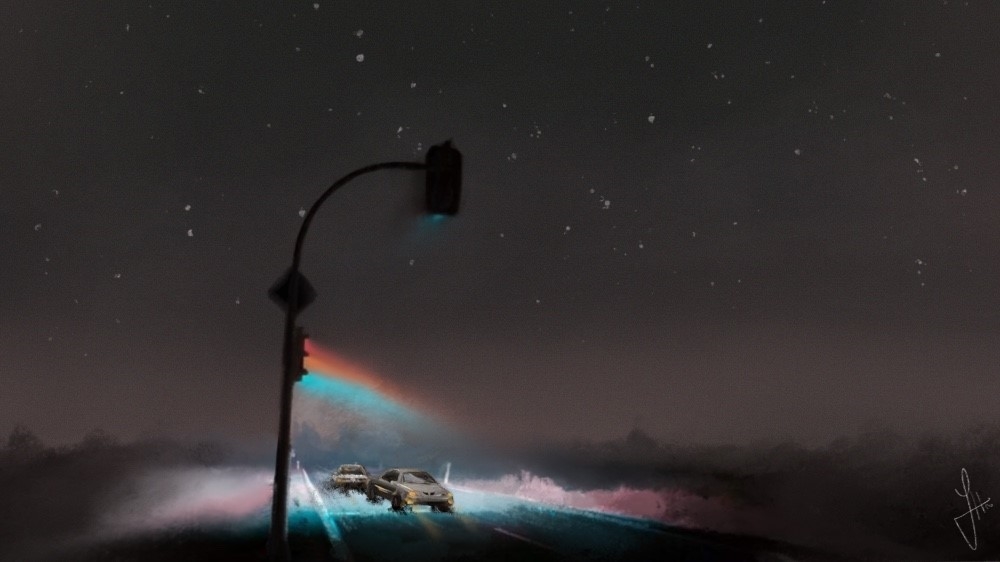The dark road of dementia
On a car ride home, a woman thinks she is being followed, only to find an unexpected driver in the car behind her.

I have always tried to keep my fears a secret from my daughter. I want her to believe that I am the fierce woman I pretended to be in college. A poster on my dorm wall said, “Don’t be scared; be scary.”
This prescription, I am learning in middle age, is limiting not just because it does not fit my particular psychology, but because it ignores the unique powers of most women. That is, we are trusted precisely because we are not scary.
Keep reading
list of 4 itemsIn India’s richest state, exam scams kill escape from farm crisis
Displaced 12-year-old boy becomes Gaza’s youngest medic
Why are so many young Americans suffering from mental distress?
My daughter learned this lesson with me one night while we were driving 30 miles (48km) away to check out a piano we had seen on Craigslist. I had spoken on the phone with the seller, ascertained that she was a woman, but as the landscape’s anonymity deepened, so did my worries. My daughter’s forehead pressed against the backseat window, its hard coolness a reassuring, if flimsy, barrier between her and the cars whizzing by outside, the darkening forests, and God knows what else.
The road that led to the fancy house that had no Craigslist killer, but just an overpriced, broken piano snaked through “Indian Territory” for a few miles.
“What does ‘Onondaga Nation Territory’ mean, mummy?” she asked, stopping hard on the second “n”, unlike us locals who treated it like a stepchild: Onadaga.
I considered how to explain the ignoble history of our country’s treatment of indigenous people. I offered an explanation of Indian Reservations that was as dull and withholding as the winter sky. I did not tell my daughter how my childhood friend’s mother had warned us not to drive in “The Res” at night, especially two girls alone.
“I think it’s pretty here,” she said.
She was right. Even in the limited palette of central New York’s late January colours – brown, gray and dirty white – the view was beautiful with rolling hills and dense evergreen forests, black at dusk. I wondered why we had been afraid of the people who lived here. I wondered if they had been afraid of us.
Flight, not fight
On our way home, darkness had filled the road like a broken dam.
As slowly as we drove, we still managed to catch up to another car. I was happy for the company, the dark being only occasionally relieved by some post-season Christmas lights.
This other vehicle quickly annoyed me, though, with its sudden and inexplicable decelerations. Twice it signalled, once to the right, next to the left, but never when there was an actual street on which to turn.
They must be drunk, I thought. I could pass easily on this vacant road, so I gunned it to 30 miles per hour (48km/h) – it was January, after all, and black ice lay in wait to mock you for your ridiculous confidence like a sibling – and finally shook him.
I could not see as well without his car guiding the way, but at least I would not rear-end him, or worse.
“Mummy, guess what happened?”
“Hon, I’m driving. Talk to me later,” I said a little like a tightly wound Annette Bening in American Beauty. To justify my tone, I also turned off the radio, flashed the high beams, and adjusted the rearview mirror, in whose rectangular frame I noticed that the car I had just passed was gaining on me.
For miles, that car had hemmed and hawed, but now it trailed me, even when I floored it to 40mph (64km/h). Did I antagonise him, I wondered. Was it my peeling “Hillary 2016” bumper sticker? Hillary was especially unpopular with drunks, even now.
Other cars passed me, but this drunk psycho was sticking to my tail like burdocks. My daughter had fallen asleep despite the waves of cortisol flooding the atmosphere. Although she lived in a dangerous world, at eight years old she felt safe as long as she was with her mother. I was such a fraud. A grown woman, a mother, and a feminist, my instincts were nonetheless flight, not fight.
I remember when I was my daughter’s age and the principal had declared on the public address system that a “man in a white van” was trying to kidnap children, I ran home until my knee socks were loose around my ankles. I have been looking over my shoulder ever since. I think my male classmates, though, transcended that mindset with the help of a culture that trained them to fight, defend and conquer. A month after 9/11, I asked a male friend if he was going to cancel travel plans that he had made before the attack. This amused him. “I wish somebody would try to hijack a plane I was on.” I wanted to be the kind of person who said, “Let’s roll”, and then burst into the cockpit. But I was not.

After a tense 20 miles (32km), I finally reached the traffic light in our small town where I would turn towards my sleepy neighbourhood. The car was still behind me, only now with its blinker, just like mine, directed north. Three blocks from home, I reached for my phone to call my husband.
“I’m being followed,” I whispered so my daughter would not wake up. “I’m around the block, but I can’t go down our street ‘cause they’ll know where we live.”
My husband, a Brooklyn native, said through a yawn, “I’ll get a bat and meet you out front.”
“I’m driving straight to the police station. Just stay on the phone with me.”
The car blew through the same irrelevant stop signs and red lights that I did.
“Oh God!” I gasped as I closed in on the police station. “He’s turning in also.”
I dropped the phone amid a Starsky and Hutch manoeuvre. My plan was to park, tear my sleeping daughter from the back seat, and charge into the entrance before my assailant could bludgeon me. But I had no sooner slammed the car into park than he pulled into the adjacent spot.
A script would have called for a shriek murderous enough to rouse the bored small-town cops inside, but instead, I was stunned into a stammer. My eyes fixed on the driver who had been following me for the last 45 minutes. I felt around for the phone and mumbled to my husband, “I’ll call you back.”
Don and Delores
The silent sobs of the elderly woman reached me through her closed window and mine. Her mouth, with an agonising absence of subtlety, churned the words: “Thank! You!”
I bolted from the car, rushing to meet her at her window, which was already down. We instinctively grabbed each other’s shaking hands.
“I’m lost,” she wept. “I don’t know where I am or how I even got here.”
“What’s your name?” I asked, still breathless.
“Delores,” she said. She looked younger up close, wore stylish glasses, and had the large, capable hands of a volleyball or piano player.
“Delores,” I repeated calmly, “you scared the hell out of me. I thought I was being followed.”
“Oh, I was following you,” she replied innocently. “I was terrified I was going to lose you. I didn’t know where I was so I just kept following you.
She has a husband, she said. His name is Don, she said. And his phone number she recited like a prayer she had recently memorised.
The man who answered the phone was cheerful. I had expected frantic relief, but instead got the impression that he had been curled up on the couch watching Monday Night Football. I summarised the events of the previous hour, and when I asked if this had happened before, he said no. The game, if it had ever been on, was likely far from his mind. I told him I would escort Delores back to Baldwinsville, a town 20 minutes away.
I assured her we would drive slowly, that she was to do exactly as she had done on Route 20, that Don was waiting for her.
Our road had been like a sentence whose words she could decode, but whose meaning she could not comprehend.
So with no assistance and no guidance from husbands or inconvenienced policemen, Delores and I, two women alone, found our way back to her house. When we reached the address Don had given me, a beautiful farmhouse that looked like many children could have grown up there, Delores secured her car in the detached garage, most likely for the last time.
I hated to just leave her, them, in this new era of their lives, when glasses would no longer be enough for night driving. Our road had been like a sentence whose words she could decode, but whose meaning she could not comprehend. Nonetheless, she was buoyant, and surprisingly tall. “Thank you for saving my life,” she said, reaching for my hands again. I hugged her.
“Thank you for making sure that I did.”
The darkest road
About a mile down the darkest road I had ever driven on, I thought about when my mother had asked me for a ride home while sitting in her coat on her own living room couch. That same unrequited homesickness would be regular life for Delores from then on. Did Delores have a daughter who had had to ask her why she was wearing three turtlenecks at once? Had she given this daughter two birthday cards on consecutive days with two extravagant cheques inside, inspiring delight then distress? Would Delores ever surrender comically to her loss of words and reply, “meow”, to her daughter’s questions, making them both laugh despite it all?
From the back seat, my wakened daughter asked who that woman was.
“Delores,” I said, too tired now to tell the whole story she had missed while sleeping.
“Why did Delores follow you?” she asked, revealing that maybe she had not been sleeping the entire time.
“Because,” I said, “she thought I’d get her home safely.”
So smitten by my short sermon, I missed our turn, and we had to backtrack.
“Are we lost?” my daughter asked sleepily.
“Nope. Not at all. We’ll be home soon.”